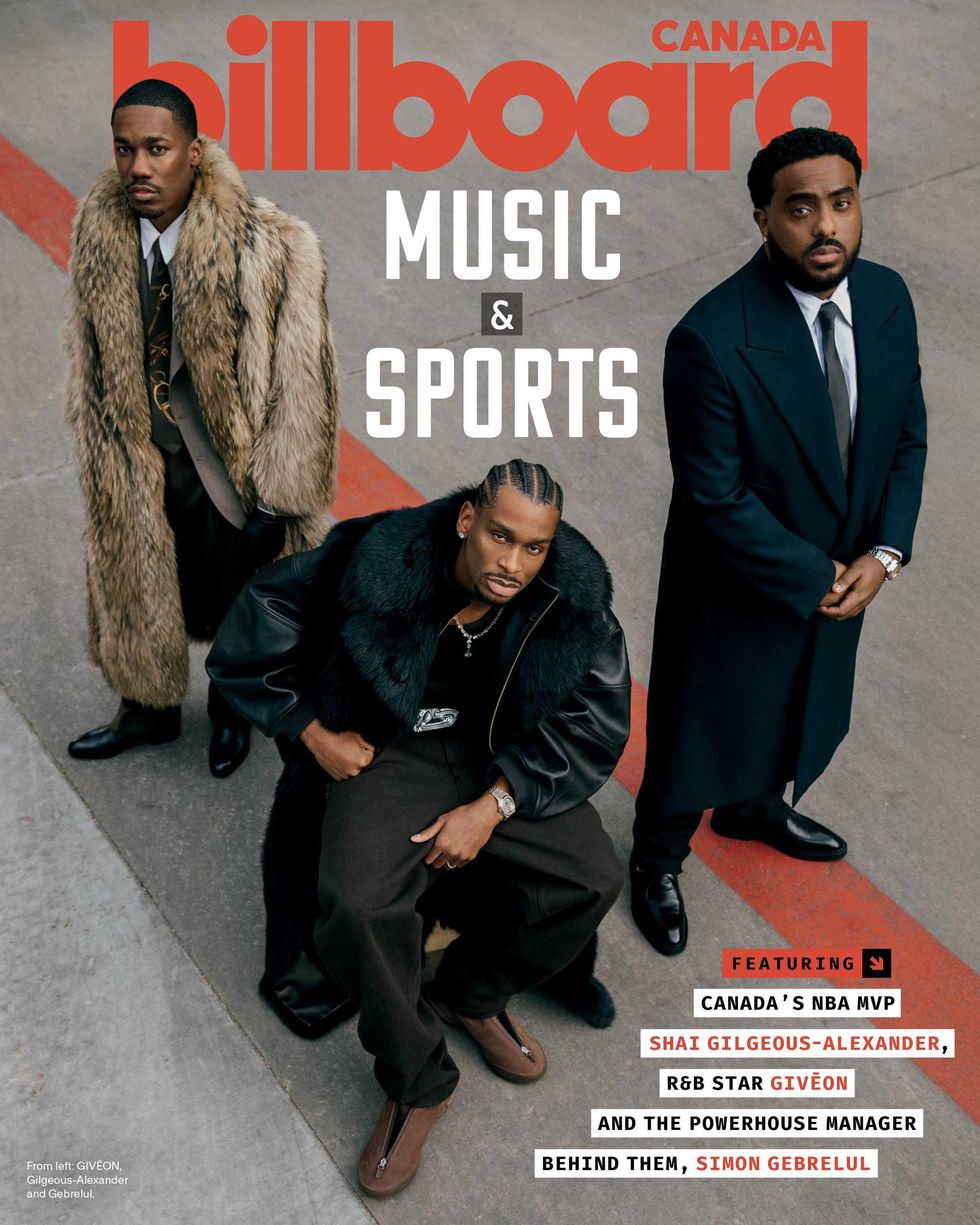Spotify's Former Data Alchemist Gives Every Song a Genre
Glenn McDonald, the mastermind behind thousands of music microgenres at Every Noise At Once, was let go in the streaming company's recent layoffs, but he's still digging into the data to share his insights on how streaming changes music.
Spotify wrapped 2023 with some bad news: a layoff of about 1,500 employees.
One of those employees was Glenn McDonald, a guy responsible for one of the most extraordinary sites on the internet, one with an uncertain future. You may not know his name, but if you’ve used Spotify, you know his work.
Like a song-recommendation algorithm in human form, McDonald has made a career – or several – distilling insights from masses of music data.
So it makes perfect sense that he found himself at the Swedish streaming giant a dozen or so years ago, hired to be its “data alchemist.” That purposely vague title meant that McDonald was given the keys to Spotify’s mountains of listening data to perform all sorts of mathemagical tricks.
“It's amazing what one person can do with modern technology and enough computers,” says McDonald in a recent Zoom interview from his home in Cambridge, Mass. Behind him is a wall of rare CDs that you’d be unlikely to find online, even in an era where every song is a click away.
“I worked on fraud detection and on the artist similarity algorithms, and on tons of editorial tools and internal metrics,” McDonald says of his work at Spotify. “Just basically anything I could do to extract insight from all this listening data.” And yes, much of his job went into the company’s most meme-worthy data dump of the year, Spotify Wrapped.
But McDonald’s most enduring trick was to give every noise a name – to classify all the music that we consume into distinct and meaningful (and at times oddly named) genres.
By the time he was let go on Dec. 4, 2023, he and his team had categorized millions of tracks, from about one million artists, into 6,291 named genres, from aarhus indie to zydeco.
It includes 56 varieties of reggae, 202 kinds of folk and 230 types of hip hop, give or take.
All of them are collected on Every Noise At Once, a gloriously minimalist website that can easily hoover up hours of your time as you peel back layer upon layer of auditory revelations.
It remains my favourite way to discover new and interesting music – music that my personalized “Discover Weekly” playlist on Spotify wouldn’t dare recommend. Covertronica, anyone? How about weirdcore? Without Every Noise, how would I ever have stumbled upon Solfeggio frequencies or The Sorry Apology Song Person?
(And I’m sorry for making you listen to that.)

The joy of discovery here is not just about coming across songs that you’ve never heard before, but opening a portal to entire styles of music and performance that, moments ago, you didn’t know existed. Some of these portals are micro-niches of artists who may not meet Spotify’s new threshold for earning royalties. Others may be extremely popular in another part of the world or to an entirely different demographic.
In the world of Every Noise, genres are arranged in a long scrolling word map, a scatter plot that’s colour coded and loosely arranged so that “down is more organic, up is more mechanical and electric; left is denser and more atmospheric, right is spikier and bouncier.”
Click on a genre name to hear a sample, or click on the chevron next to it and you’re taken into another word map, another world, of the artists that fill this particular genre.
Then click on the chevron next to an artist and you get a page with complete details about the artist, all their tracks on Spotify, and all the other genres their music belongs to. Click on one of those and the discovery cycle begins anew.
Before you know it, you’ve been sucked into a musical multiverse.
You can explore music by city, by country, by label or by gender. And every categorization has its own dedicated playlist on Spotify.
Drill down, if you dare, on Canada’s 106 genres, from Inuit pop to chanson Quebecoise to Canadian stoner rock.
For a true armchair mind trip, there’s the Sound of Everything playlist, with one sample track for every named genre. That’s more than 24 hours of music. You’re guaranteed to find a lot you don’t like but also new discoveries that you do.
Curiously, the genre names don’t usually show up on Spotify itself — except, for instance, during Spotify Wrapped, the annual event where we all have our past year of binge-listening handed back to us and we learn the embarrassing tracks and genres we listened to most.
It’s here that McDonald’s work in the shadows sometimes got an unwanted spotlight, as confused listeners wondered how they could possibly be such avid fans of a genre they never knew existed. Most notorious is the so-called escape room genre, which McDonald coined in 2016. It’s plagued him ever since.
“I got a fair amount of shit for naming things,” McDonald admits.
Escape room describes “a trap pop kind of dance crossover, sort of Lizzo and everything around Lizzo when Lizzo was first getting popular. And I just couldn't think of a name. And it was about when escape rooms were starting to be a thing and the music had some trap elements, but was kind of ‘escaping from trap.’ And so I'm just like, alright, ‘escape room.’”
Reflecting back, he says, “It was not a goal to invent names… but when you have all this listening data, you sometimes find that you can see patterns that exist before they have come up with names for themselves in the world.”
Does he have a favourite?
“I think the best name I came up with was permanent wave, which was my name for stuff that was new wave when it was new, but it's 30 years later, or 40, and some people are still listening to it.”
Every Noise actually began as an outgrowth of the Echo Nest, a platform that Spotify acquired, along with McDonald. (“Spotify was actually my sixth corporate acquisition,” he says.)
Once upon a time McDonald was a music writer, penning a review column "for 10 years before blog was a word.” Even then he was into music data. He would eventually collaborate with the Village Voice on their influential annual Pazz & Jop music critics poll, “which was big data back in the day.”
He would “scrape the whole poll’s data and try to do analysis and look at patterns” among the top 10 lists submitted by hundreds of music critics, further ranking the year’s top albums according to enthusiasm, hipness and more. It was a project he started on his own before the Voice brought his findings on board.
He hasn’t given up on writing, and his swan song at Spotify dovetails with the upcoming release of his book, You Still Have Not Heard Your Favourite Song: How Streaming Changes Music.
The book promises to offer the cons as well as the pros of the streaming era, but there’s no doubt a site such as Every Noise could never exist without it.
I wanted to know, after so many years immersed in music, what continues to surprise him about it.
“There are two or three chapters that are about answering that question,” McDonald says. “But it's been amazing to me, the things I have discovered about the world.
“I mean, I'm a fairly well educated person. I would think of myself as someone who knows things about the world. Yet so many times in the process of finding music, I just discover, ‘Oh, I don't know that much.’
For example?
“Like the evolution of Turkish Hip Hop among migrant workers in Germany, (or) the migrant workers from the Philippines in the UAE who cause Christmas music to start being played on September 1st in the Middle East. These are amazing stories to me!”
Every Noise devotees would routinely check in on Fridays when a heap of new releases was uploaded to the word cloud — that is, until that practice stopped in December.
In January, McDonald added a small note to the bottom of the page explaining that his layoff from Spotify – part of a 17% cut to its global workforce that also included a well-known leader of Spotify’s Canadian outpost, Nathan Wiszniak – meant he no longer had privileged access to its data. Every Noise would no longer be updated with new releases and more of its features could eventually be disabled. There’s an ongoing petition on the Spotify Community pages to revive those missing features.
So far, there’s been no official response, but a spokesperson for Spotify tells Billboard Canada that the current status of Every Noise is likely to remain for the foreseeable future – meaning, there are no plans to resume its access to restricted data, nor are there planned changes to the Spotify API that would further limit the site’s access. The work that McDonald’s team was doing continues, the spokesperson adds, albeit without him at the helm.
I had two final questions for McDonald.
What does Spotify lose without him there?
“I think we've barely begun to figure out what to do with all the potential for having the world's music in one place. It was fun to have a chance to make some progress on that in 12 years ... And that's longer than I had at any other job before that. But I wasn't done.”
And what do we lose now that Every Noise is cut off from the Spotify data spigot?
“In terms of practical implications, it's bad for new releases, but liveable for old releases,” he concludes.
With nearly 6,200 named genres — and the multiverse of musical territories they cover — “there’s more than you can explore in your lifetime.”

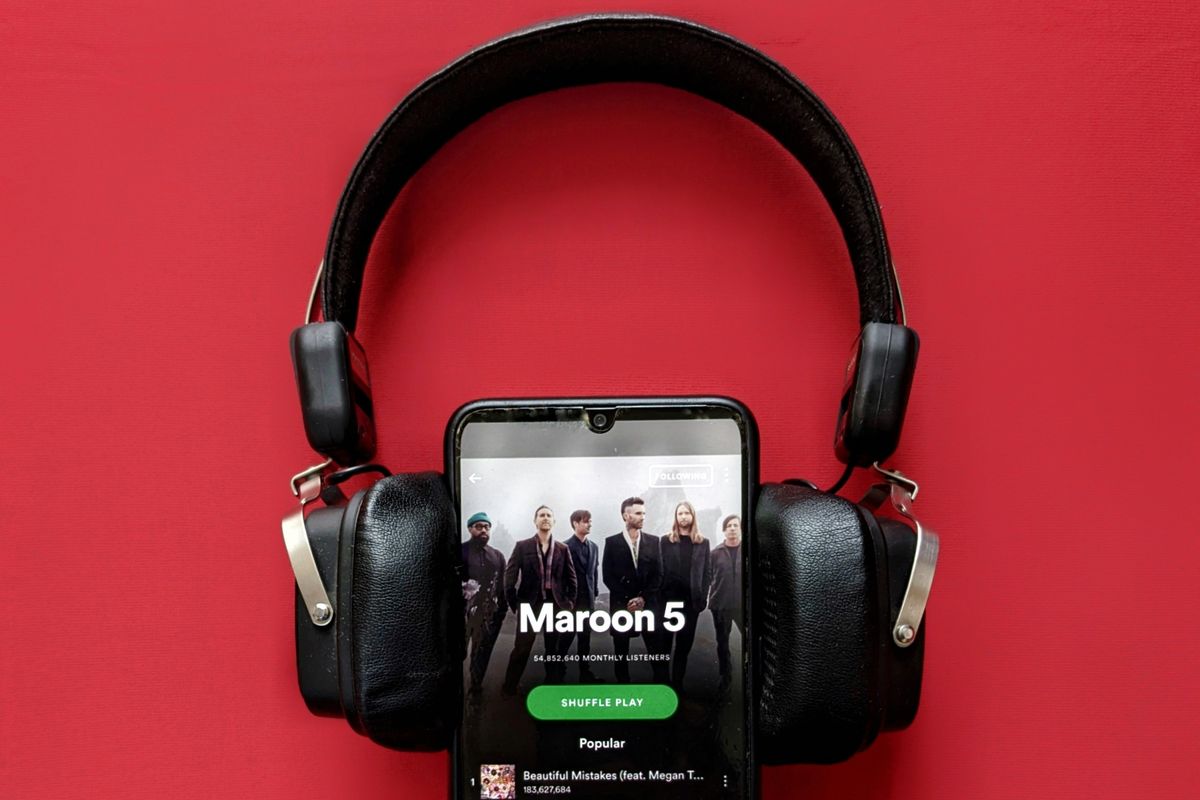
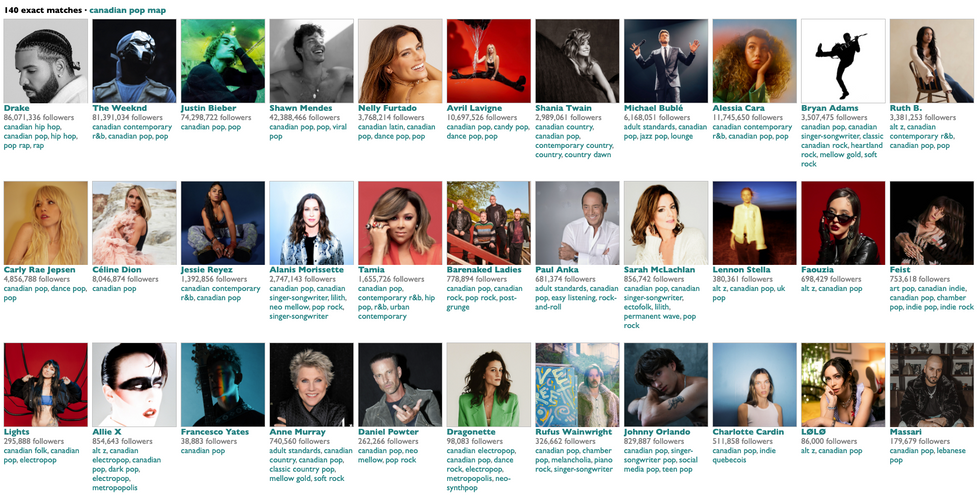
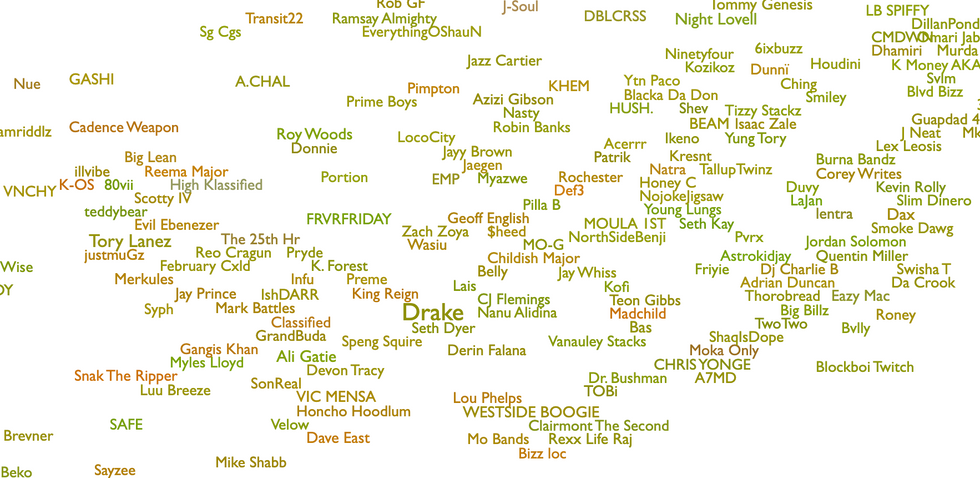
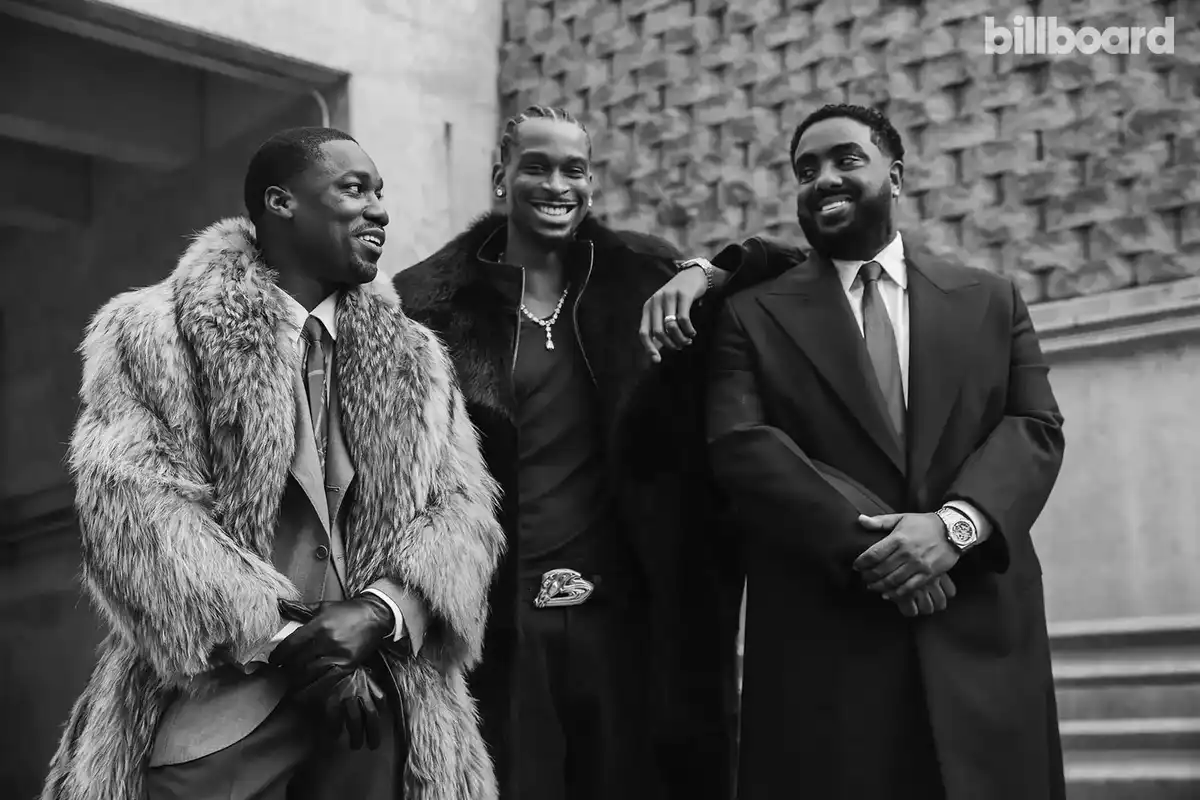



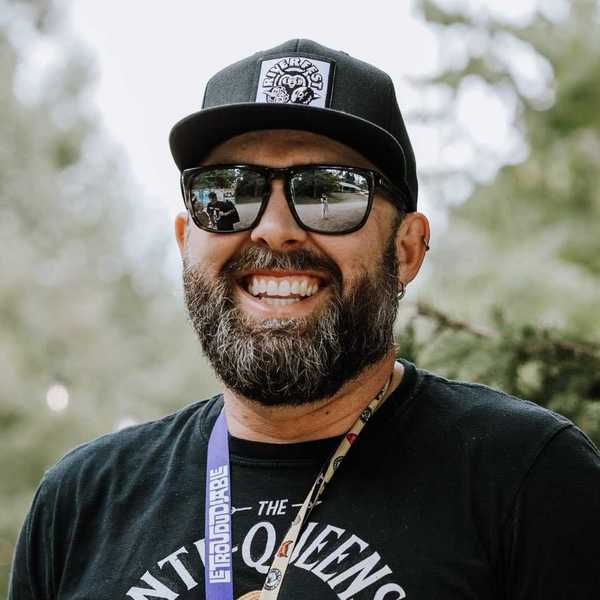








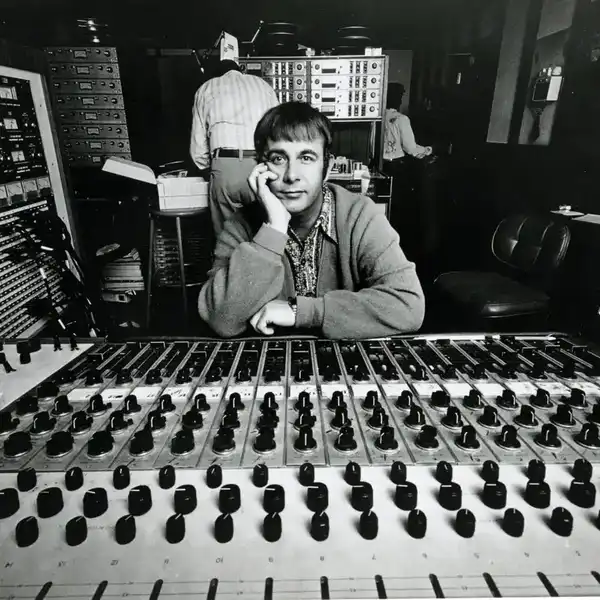



 Simon GebrelulDiwang Valdez
Simon GebrelulDiwang Valdez Shai Gilgeous-AlexanderDiwang Valdez
Shai Gilgeous-AlexanderDiwang Valdez GIVĒONDiwang Valdez
GIVĒONDiwang Valdez